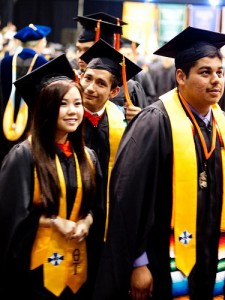California Dream Act: ‘As An Undocumented Immigrant, It’s Unfair That My Hard Work Might Not Lead To College’
 With the California Dream Act and the California Prosperity and Opportunity Act, California seems to be at the forefront of immigrant rights.
With the California Dream Act and the California Prosperity and Opportunity Act, California seems to be at the forefront of immigrant rights.
(Flickr: inyhack)
via Huffington Post
###
This is a teen-written article from our friends at L.A. Youth, a nonprofit organization that helps teens advocate for themselves through journalism, literacy and civic engagement.
We’re running this story anonymously to protect the identity of the writer, who is an undocumented immigrant.
I’ve always worked hard in school because I want to go to college and be successful. But because I’m not a citizen, my hard work could be for nothing. My parents don’t have the money to pay for college and I can’t get federal financial aid because I don’t have a Social Security number. In October, Governor Jerry Brown signed the California Dream Act, which will allow undocumented students like me to get financial help to attend public colleges in California. This made me feel hopeful for my future. However, the state Dream Act doesn’t provide a path to citizenship. Even if I graduate from college, would I have to work in a low-wage job? Will my status prevent me from obtaining my dream job as a journalist?
I think it’s really unfair that I can’t get the same opportunities as a citizen. I grew up here like any other student. Some people say that undocumented immigrants are criminals because they came here illegally. But I don’t consider myself a criminal because it wasn’t my choice to come here. My parents brought me here because they believed they could provide a better education and a better life for me and my sister.
When I was two, my parents left my older sister and me with my grandma and came to the United States. They were trying to give us a better life than what they had in Mexico. We were living in a small one-room house and my sister and I were sharing a bed with our parents. Their plan was to live in the United States for a few years and then return to Mexico once they made enough to buy a house in Mexico, pay for our education and open a business. But they stayed because they weren’t able to make enough money. We were brought to the United States right before I turned three and my sister was five because my mother missed us and she couldn’t bear being apart from us. Three years later my little sister was born here and a few years after that my brother was born.
Once I was here for a few years I forgot about Mexico and the United States became my home. I liked McDonald’s for the toys in the happy meals. One of my favorite things to do was watch cartoons, like Ren & Stimpy, Looney Toons and Animaniacs. I didn’t know English but the TV shows were helping me learn it.
When we were young my mother would tell us to do well in school so we wouldn’t end up like her and my father. I don’t think they understood that attending college was hard if you’re undocumented. They worked as street vendors. They’d wake up at 3 a.m. to prepare the champurrado, a drink like hot chocolate. They’d leave the house at six a.m., carrying the champurrado and heavy pots full of tamales. They’d get home at 10 a.m., rest, and then prepare for the next day. They always seemed busy buying ingredients and making the tamales. But they still dedicated time to my sister and me. They’d wake us up and get us ready for school. My mom would take us to school with her cart full of tamales.












Showing 1 reaction
Sign in with